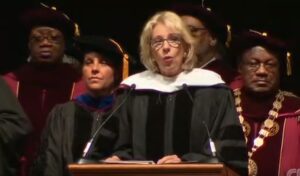Notice: Undefined offset: 1 in /var/www/wp-content/themes/jnews/class/ContentTag.php on line 86
Notice: Undefined offset: 1 in /var/www/wp-content/themes/jnews/class/ContentTag.php on line 86

By Jessica Johnson, For The African-American Athlete
When educator and civil rights activist Mary McLeod Bethune said that “education is the great American adventure, the world’s most colossal democratic experiment” in her commencement speeches at Hampton Institute and Lincoln University in 1934, I wonder if she ever imagined that future graduates of Bethune-Cookman University, the historically black college she founded, would be addressed by a polarizing political figure like current U.S. Education Secretary Betsy DeVos.
DeVos was met with boos and turned backs of Bethune-Cookman graduates this month while giving her commencement remarks at this storied HBCU. Given the unfavorable 13 percent approval rating that President Donald Trump has among African Americans and the historical gaffe that DeVos made earlier this year about HBCUs being “pioneers of school choice,” the incensed reception she received was not shocking.
As a proud HBCU alumna of North Carolina Central University, I understand the frustration that many of Bethune-Cookman’s 2017 class expressed. However, I am not opposed to someone like DeVos speaking on HBCU campuses because I believe, as DeVos stated in her address, that we need to “converse with and learn from those with whom we disagree.”
It’s just that a black college commencement was not a good venue for the education secretary right now, especially with many HBCU educators questioning Trump’s commitment to them after he considered cutting $20 million in funding for their institutions.
Furthermore, HBCU alums and those who have attended graduation ceremonies of these schools will tell you that these celebrations are sacrosanct within the black community, and most speakers chosen by HBCU administrations understand this tradition.
Going to an HBCU commencement, most of which are in the South, is like going to a black church on Sunday morning. One special feature at every graduation is the spirited and soulful singing of a school’s gospel choir. At my NCCU commencement, the choir sang “Peace Be Still” and “Rock-a My Soul in the Bosom of Abraham.” Hands were extended in worship and there was hardly a dry eye among my classmates in our football stadium.
One of my high-school friends who graduated from Savannah State University fondly remembers her school choir singing “Even Me Lord, Even Me,” a most appropriate selection for her since she was the first in her family to earn a four-year degree.
And speaking of family, some often come by busloads. A former colleague of mine from Central State University in Wilberforce, Ohio, remembers seeing family members of students renting buses from Chicago and Detroit to celebrate the graduation of “a child, niece, nephew, and grandchild.”
Another significant graduation memory that stands out for me is that my NCCU commencement speaker was Dr. Helen G. Edmonds, the first African-American woman to receive a Ph.D. from Ohio State, a path that I was destined to follow.
I’m actually sorry that DeVos did not get to experience the fullness of the lively HBCU culture at Bethune-Cookman, but given the distrust that most African Americans have regarding the Trump administration, this was not possible. Under DeVos’ watch, the Department of Education is rolling back protections for borrowers of student loans. This will hit HBCU students hard, since many carry higher debt than their peers at other universities.
The Trump administration did decide to restore year-round Pell Grants, aid received by almost three in four HBCU students, which will provide some help with paying tuition. Yet, there remains enormous skepticism about how HBCUs will fare with Trump in office. One positive outcome that may result from DeVos’ controversial visit to Bethune-Cookman is that she is on record saying she is “at the table fighting” for HBCUs.
HBCU presidents and students are definitely going to hold DeVos accountable for this pledge of support, but I also hope she takes to heart the themes of service that she mentioned regarding Mary McLeod Bethune’s legacy.
DeVos emphasized Bethune’s unwavering faithfulness in preparing young people to help those who are “underprivileged, ill-housed, impoverished, and victimized by discrimination.”
This is the core premise of the mission statements of all HBCUs, and if DeVos is truly sincere about backing them, then she will learn why our institutions have a vital role in higher education in our country.
Jessica A. Johnson is a correspondent for The Columbus (Ohio) Dispatch. Follow her on Twitter @JjSmojc.
